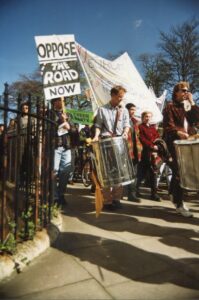The present-day ecology movement emerged among the new social movements of the 1960s and 1970s. Its immediate influences were varied. They included the Aldermaston marches of the late 1950s and the impact of the ‘Earth Rise’ photograph taken during the Apollo 11 Moon landing of 1969. The ideas of writers such as Rachel Carson (Silent Spring,1962), E. F. Schumacher, Murray Bookchin and others were also inspirational. In 1972 the ecology movement found early political expression in the PEOPLE Party, renamed the Ecology Party, the forerunner of today’s Green Party. Soon, the larger political parties also began to adopt environmental policies.
The ecology movement, however, was never confined to the electoral arena. The 1980s saw a second wave of anti-nuclear and peace activism, most famously at Greenham Common and Molesworth, and huge support for groups such as Greenpeace and Friends of the Earth, heightened by events such as the bombing of Greenpeace’s ship the Rainbow Warrior in 1985 and the Chernobyl nuclear disaster of 1986. In the 1980s and 1990s many in the West of England region, as elsewhere, took direct action to protect particular habitats, non-human species and the Earth as a whole.
This panel will be made up of people in the West Country able to give first-hand accounts of environmental direct action in the 1980s and 1990s. It will include former participants in anti-nuclear activism, road protest, Earth First! and Reclaim the Streets. As they reflect and share ideas, there will be opportunity for discussion and questions and answers. It is hoped such conversations can provide useful context for the current resurgence in environmental activism on the part of Extinction Rebellion, Earth Strike and Youth Strike 4 Climate.

Event details




